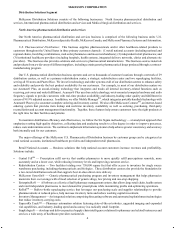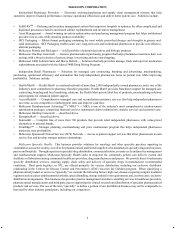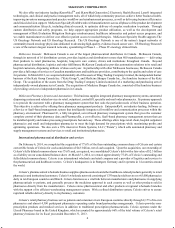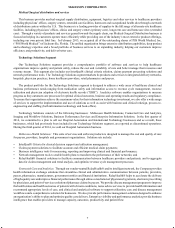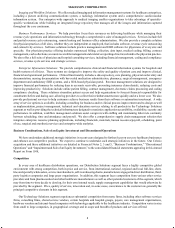McKesson 2014 Annual Report Download - page 17
Download and view the complete annual report
Please find page 17 of the 2014 McKesson annual report below. You can navigate through the pages in the report by either clicking on the pages listed below, or by using the keyword search tool below to find specific information within the annual report.
McKESSON CORPORATION
14
Interoperability Standards and Meaningful Use Requirement: There is increasing demand among customers, industry groups
and government authorities that healthcare software and systems provided by various vendors be compatible with each other. This
demand for interoperability is leading to the development of standards by various groups, such as Commonwell Health Alliance,
which the Company and other healthcare IT companies announced in 2013. Certain federal and state agencies also are developing
standards that could become mandatory for software and systems purchased by these agencies, or used by our customers. For
example, the HITECH Act requires meaningful use of “certified” healthcare information technology products by healthcare
providers in order to receive stimulus funds from the federal government. Although several of our healthcare information technology
products have received certification while others are on track to receive certification, rules regarding meaningful use may be
changed or supplemented in the future. As a result, we may incur increased development costs and delays in receiving certification
for our products, and changing or supplementing rules also may lengthen our sales and implementation cycle. We also may incur
costs in periods prior to the corresponding recognition of revenue. To the extent these rules subsequently are changed or
supplemented, or we are delayed in receiving certification for our products, customers may postpone or cancel their decisions to
purchase or implement these products.
FDA Regulation of Medical Software: The FDA has increasingly focused on the regulation of medical software and health
information technology products as medical devices under the federal Food, Drug and Cosmetic Act. For example, in 2011 the
FDA issued a rule on medical device data systems (MDDS) that now regulates certain software systems that electronically store,
transfer or display data originating from medical devices as Class 1 medical devices (i.e., those devices deemed by the FDA to be
low risk and subject to the least regulatory controls) themselves. If the FDA chooses to regulate more of our products as medical
devices, it can impose extensive requirements upon us. If we fail to comply with the applicable requirements, the FDA could
respond by imposing fines, injunctions or civil penalties, requiring recalls or product corrections, suspending production, refusing
to grant pre-market clearance of products, withdrawing clearances and initiating criminal prosecution. Any additional FDA
regulations governing health information technology products, once issued, may increase the cost and time to market of new or
existing products or may prevent us from marketing our products.
Standards for Submission of Healthcare Claims: HHS previously adopted two rules that impact healthcare claims submitted
for reimbursement. The first rule modifies the standards for electronic healthcare transactions (e.g., eligibility, claims submission
and payment and electronic remittance) from Version 4010/4010A to Version 5010. The enforcement deadline for the 5010 rule
was extended through June 30, 2012 and many healthcare providers began implementing the 5010 rule. The second rule updated
and expanded the standard medical code sets for diagnosis and procedure coding from International Classification of Diseases,
Ninth Revision (“ICD-9”) to International Classification of Diseases, Tenth Revision (“ICD-10”). As a consequence of the passage
of the Protecting Access to Medicare Act of 2014 in March, the compliance date for ICD-10 conversion has been postponed from
October 1, 2014 to October 1, 2015. Updating systems to Version 5010 for electronic healthcare transactions (e.g., eligibility,
claims submission and payment and electronic remittance) is required for use of the ICD-10 code set. Generally, claims submitted
not using Version 5010 and ICD-10 when required will not be processed, and health plans not accepting transactions using Version
5010 and ICD-10 may experience significant increases in customer service inquiries. We may incur increased development costs
and delays in delivering solutions and upgrading our software and systems to be in compliance with these new rules. In addition,
these rules may lengthen our sales and implementation cycle and we may incur costs in periods prior to the corresponding recognition
of revenue. Delays in providing software and systems that are in compliance with the new rules may result in postponement or
cancellation of our customers’ decisions to purchase our software and systems.
Medical Billing and Coding: Medical billing, coding and collection activities are governed by numerous federal and state
civil and criminal laws. In connection with these laws, we may be subjected to federal or state government investigations and
possible penalties may be imposed upon us, false claims actions may have to be defended, private payers may file claims against
us and we may be excluded from Medicare, Medicaid or other government-funded healthcare programs. Any such proceeding or
investigation could have a material adverse impact on our results of operations.


